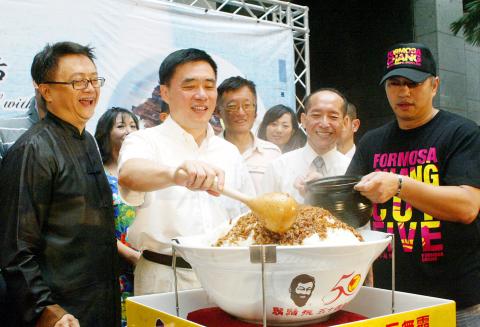The Taipei City Government yesterday prepared and dished out more than 1,000 bowls of braised pork on rice free of charge in an attempt to set the record straight about the Taiwanese delicacy after the dish’s origins were mistakenly attributed to China in Michelin’s Green Guide Taiwan.
Known as luroufan, the Michelin guide labeled the dish as an “elemental staple of Shandong [Province] cuisine.”
“Today we’re here to let everyone know that luroufan is genuine Taiwanese cuisine, a national delicacy, not a ‘Shandong-style’ dish,” Taipei Mayor Hau Lung-bin (郝龍斌) said during a press conference to defend the honor of the dish.

Photo: CNA
After finding out Michelin listed the dish as originating from Shandong Province in China, Hau wrote to the group’s editorial manager Jonathan Gilbert and requested a revision.
Hau wants to have the original text replaced with: “Braised Pork Rice, a true classic Taiwanese street delicacy.”
“This satisfying, yet inexpensive Taiwanese traditional savory dish is a meal in itself,” Hau wrote in an e-mail dated July 6, along with a short introduction to the Taiwanese dish.
Florent Bonnefoy, Michelin travel guides manager, answered in an e-mail that the group conducts regular updates and revisions to provide accurate information.
“As we hope to have reprints and further editions of our Taiwan Green Guide, we will naturally input the necessary changes and updates,” Bonnefoy said in response.
He did not say whether Michelin would change the description.
Liang Yu-hsiang (梁幼祥), a gourmet reviewer in Taiwan, also presented written proof from the Beijing-based Chinese Food Culture Research Association at the press conference, which said “there is no such food item in Shandong.”
“It is definitely a local delicacy,” Liang said. “Maybe there are nuances [in names] between northern and southern Taiwan, but it has nothing to do with Shandong.”
The Taiwanese public also found it hard to accept that China was given credit for a Taiwanese dish.
“I have been enjoying this traditional snack food all my life, and it’s very Taiwanese to me,” a woman standing in line for the free luroufan said.
The city blamed the mix-up on the first character in the Chinese name of the dish, lu (魯), which is also an alternate name for Shandong Province, where the State of Lu reigned about 2,200 years ago. The city is now urging the public to start using a homonym which means braising (滷), to avoid confusion.
The organizers added that several restaurants and vendors are scheduled to host daylong promotional campaigns.

The Grand Hotel Taipei on Saturday confirmed that its information system had been illegally accessed and expressed its deepest apologies for the concern it has caused its customers, adding that the issue is being investigated by the Ministry of Justice Investigation Bureau. The hotel said that on Tuesday last week, it had discovered an external illegal intrusion into its information system. An initial digital forensic investigation confirmed that parts of the system had been accessed, it said, adding that the possibility that some customer data were stolen and leaked could not be ruled out. The actual scope and content of the affected data

‘LIKE-MINDED PARTNER’: Tako van Popta said it would be inappropriate to delay signing the deal with Taiwan because of China, adding he would promote the issue Canadian senators have stressed Taiwan’s importance for international trade and expressed enthusiasm for ensuring the Taiwan-Canada trade cooperation framework agreement is implemented this year. Representative to Canada Harry Tseng (曾厚仁) in an interview with the Central News Agency (CNA) said he was increasingly uneasy about Ottawa’s delays in signing the agreement, especially as Ottawa has warmed toward Beijing. There are “no negotiations left. Not only [is it] initialed, we have three versions of the text ready: English, French and Mandarin,” Tseng said. “That tells you how close we are to the final signature.” Tseng said that he hoped Canadian Prime Minister Mark Carney

President William Lai (賴清德) yesterday bestowed one of Taiwan’s highest honors on Saint Vincent and the Grenadines (SVG) Ambassador Andrea Clare Bowman in recognition of her contributions to bilateral ties. “By conferring the Order of Brilliant Star with Grand Cordon on Ambassador Bowman today, I want to sincerely thank her, on behalf of the Taiwanese people, for her outstanding contribution to deepening diplomatic ties between Taiwan and SVG,” Lai said at a ceremony held at the Presidential Office in Taipei. He noted that Bowman became SVG’s first ambassador to Taiwan in 2019 and

A man walks past elementary school artworks at the Taipei Lantern Festival in Ximen District yesterday, the first day of the event. The festival is to run from 5pm to 10pm through March 15.